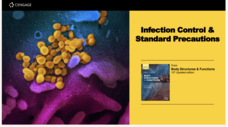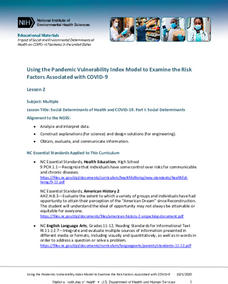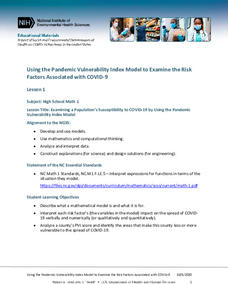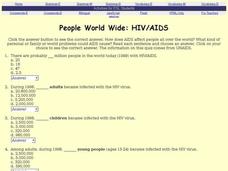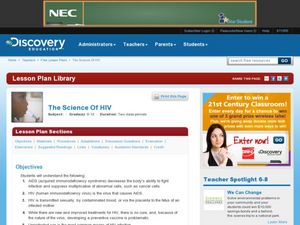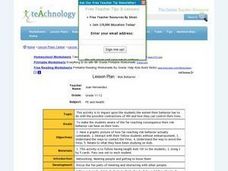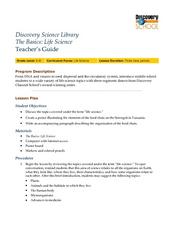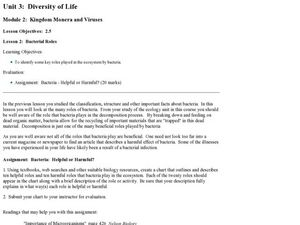Howard Hughes Medical Institute
Test Your Knowledge of Microbes
How much do you know about microbes and our understanding of pathogens? A quick 15-question quiz tests a broad range of information related to microbes. The interactive presents a score at the end, providing a great opportunity to review...
Children’s Hospital of Philadelphia
Understanding How Diseases Spread
To boost disease prevention, high schoolers arm themselves with information about infectious diseases and how they spread. Scholars research the causes, prevention techniques, and identify high-risk groups especially vulnerable to a...
Children’s Hospital of Philadelphia
Case Study: The 1918 Influenza Pandemic – Factors Beyond the Biological that Influence the Spread of Disease
A very timely activity looks at the social and political factors that affect the spread of disease. Using the 1918 Influenza Pandemic as a case study, pupils research factors that influenced the spread of the disease, including the role...
Cengage Learning
Infection Control and Standard Precautions
With the number of COVID-19 cases rising dramatically, information about how standard precautions can be used to control infection is essential. The 16 slides in a presentation outline of how people need to change their daily habits to...
Children’s Hospital of Philadelphia
Meet the Heros
Vaccine development is the focus of a lesson plan that explores its history, timeline, and how the scientific method aids the process. Following a discussion about Edward Jenner and Small Pox, learners answer questions in their journals...
National Science Teaching Association
Why Do We All Have to Stay Home?
Learners, especially young ones, might be confused about why or frustrated that we have to stay at home. Help answer questions and calm emotions with a nine-page resource that details topics regarding the COVID-19 pandemic.
National Institute of Environmental Health Sciences
Lesson 2: Using the Pandemic Vulnerability Index Model to Examine the Risk Factors Associated with COVID-19
A lesson asks young mathematicians to investigate the social determinants and the environmental factors that influence risk factors associated with the spread of COVID-19. Class members then brainstorm what they can do to alleviate the...
National Institute of Environmental Health Sciences
Lesson 1: Using the Pandemic Vulnerability Index Model to Examine the Risk Factors Associated with COVID-19
How vulnerable are you to COVID-19? High school mathematicians use the Pandemic Vulnerability Index to create models that help them collect and analyze data about the risk factors associated with COVID-19. After investigating four groups...
Children’s Hospital of Philadelphia
Vaccine History and Research
It all becomes a matter of timing. Groups use a variety of resources to research the history of vaccines by first creating a timeline of vaccine research using leading scientists' work. Learners read articles to develop a story of the...
National Institute of Environmental Health Sciences
A Student Exploration of the Global Impacts of Climate Change on Human HealthVector-Borne Diseases
Develop an understanding of how climate change affects humans' health. The class lists what they know about climate change and its connection to disease and then read sections of an article providing specific details on how climate...
Nemours KidsHealth
Colds and Flu: Grades 9-12
Flu fighters unite! To get the word out about the importance of getting vaccinated against the flu, groups create posters that persuade teens to get immunized. Also, scholars read articles about how to cope with colds, then create...
Nemours KidsHealth
Colds and Flu: Grades 3-5
Two lessons from Kids Health Network aid in the prevention of cold and flu. The first lesson challenges scholars to read articles, discuss their findings, then create a PSA for proper prevention methods. The second lesson...
Curated OER
Myth Busters: HIV Transmission
Students discuss the facts and myths about HIV. In this health lesson, students explain how diseases spread from person to another. They create a presentation to share their research findings with the class.
Curated OER
Hector's World - Lesson Plan - Interactive Episode - Computer Security: "Oops"
Students examine the need for strong passwords when working online. In this computer password lesson, students access an animated sequence at the given web site. They determine the need for computer passwords when working on shared...
Curated OER
People World Wide: HIV/AIDS
In this HIV and AIDS worksheet, students answer ten multiple choice questions about the populations most affected by HIV and AIDS, the costs to aid people with the disease and the number of people affected in 1998 by the disease.
Curated OER
For the Birds
Students examine the different types of pandemic flu viruses and virus "scares" that have occurred over the past hundred years by creating a master chart that displays the origins, transmission, symptoms, and socio-historical impact of...
Curated OER
The Science of HIV
Students research about the characteristics of HIV. In this biology lesson plan, students cite ways to prevent AIDS especially among uninformed teens. They plan a community awareness campaign targeting teens.
Curated OER
Hazard Mitigation: Bioterrorism
Students discuss different ways to spread infectious diseases. In this bioterrorism lesson plan, students model the rate of smoke emission using CalRoad software. They analyze the effects of airborne release of...
Curated OER
Viral Diseases
Students research three viral diseases of humans, plants, or animals and report their findings to the class through a presentation using a visual aid.
Curated OER
Risk Behavior
Students explore information about HIV and how the possible contractions of the disease can control their lives. The Far reaching consequences of risk behavior are discussed.
Curated OER
Word Scramble – Lesson 3
In this health worksheet, students identify and define vocabulary terms related to foodborne illness. They unscramble the words listed at the bottom of the sheet and use them to complete each of 8 blanks.
Curated OER
The Basics:Life Science
Students explore concepts in life science using segments drawn from Discovery Channel. In this life science lesson, students participate in discussions about the food chain. Students create a poster to illustrate a predator and...
Curated OER
What Sticks Can Make You Sick
Young scholars study adhesins and their receptors. In this science inquiry lesson students experiment to find adherence and use agglutination to identify adhesins.
Curated OER
Bacterial Roles
Students study bacteria and the role it plays in the ecosystem. In this bacteria instructional activity students research the roles bacteria has and submit a chart.
Other popular searches
- Viruses and Bacteria
- Computer Viruses
- Bacteria Viruses
- Deadly Viruses
- Compare Viruses and Bacteria
- Bacteria and Viruses Biology
- Bacteria Viruses Protists
- Bacteria and Viruses Review
- Viruses and Immunity
- Biology Viruses
- Viruses and Bacteria Labs
- Viruses Cut Out



